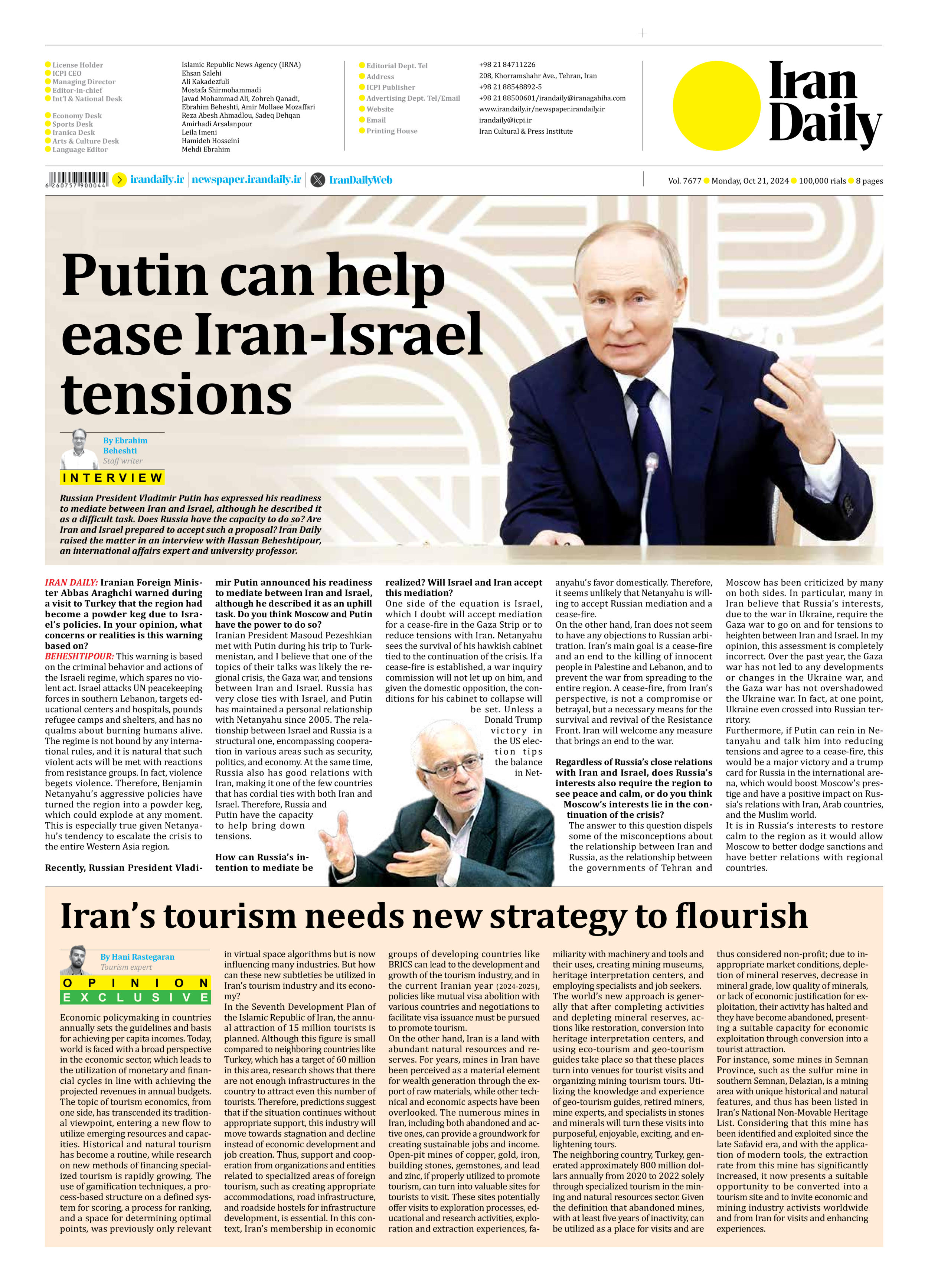
Putin can help ease Iran-Israel tensions
Russian President Vladimir Putin has expressed his readiness to mediate between Iran and Israel, although he described it as a difficult task. Does Russia have the capacity to do so? Are Iran and Israel prepared to accept such a proposal? Iran Daily raised the matter in an interview with Hassan Beheshtipour, an international affairs expert and university professor.
By Ebrahim Beheshti
Staff writer
IRAN DAILY: Iranian Foreign Minister Abbas Araghchi warned during a visit to Turkey that the region had become a powder keg due to Israel’s policies. In your opinion, what concerns or realities is this warning based on?
BEHESHTIPOUR: This warning is based on the criminal behavior and actions of the Israeli regime, which spares no violent act. Israel attacks UN peacekeeping forces in southern Lebanon, targets educational centers and hospitals, pounds refugee camps and shelters, and has no qualms about burning humans alive. The regime is not bound by any international rules, and it is natural that such violent acts will be met with reactions from resistance groups. In fact, violence begets violence. Therefore, Benjamin Netanyahu’s aggressive policies have turned the region into a powder keg, which could explode at any moment. This is especially true given Netanyahu’s tendency to escalate the crisis to the entire Western Asia region.
Recently, Russian President Vladimir Putin announced his readiness to mediate between Iran and Israel, although he described it as an uphill task. Do you think Moscow and Putin have the power to do so?
Iranian President Masoud Pezeshkian met with Putin during his trip to Turkmenistan, and I believe that one of the topics of their talks was likely the regional crisis, the Gaza war, and tensions between Iran and Israel. Russia has very close ties with Israel, and Putin has maintained a personal relationship with Netanyahu since 2005. The relationship between Israel and Russia is a structural one, encompassing cooperation in various areas such as security, politics, and economy. At the same time, Russia also has good relations with Iran, making it one of the few countries that has cordial ties with both Iran and Israel. Therefore, Russia and Putin have the capacity to help bring down tensions.
How can Russia’s intention to mediate be realized? Will Israel and Iran accept this mediation?
One side of the equation is Israel, which I doubt will accept mediation for a cease-fire in the Gaza Strip or to reduce tensions with Iran. Netanyahu sees the survival of his hawkish cabinet tied to the continuation of the crisis. If a cease-fire is established, a war inquiry commission will not let up on him, and given the domestic opposition, the conditions for his cabinet to collapse will be set. Unless a Donald Trump victory in the US election tips the balance in Netanyahu’s favor domestically. Therefore, it seems unlikely that Netanyahu is willing to accept Russian mediation and a cease-fire.
On the other hand, Iran does not seem to have any objections to Russian arbitration. Iran’s main goal is a cease-fire and an end to the killing of innocent people in Palestine and Lebanon, and to prevent the war from spreading to the entire region. A cease-fire, from Iran’s perspective, is not a compromise or betrayal, but a necessary means for the survival and revival of the Resistance Front. Iran will welcome any measure that brings an end to the war.
Regardless of Russia’s close relations with Iran and Israel, does Russia’s interests also require the region to see peace and calm, or do you think Moscow’s interests lie in the continuation of the crisis?
The answer to this question dispels some of the misconceptions about the relationship between Iran and Russia, as the relationship between the governments of Tehran and Moscow has been criticized by many on both sides. In particular, many in Iran believe that Russia’s interests, due to the war in Ukraine, require the Gaza war to go on and for tensions to heighten between Iran and Israel. In my opinion, this assessment is completely incorrect. Over the past year, the Gaza war has not led to any developments or changes in the Ukraine war, and the Gaza war has not overshadowed the Ukraine war. In fact, at one point, Ukraine even crossed into Russian territory.
Furthermore, if Putin can rein in Netanyahu and talk him into reducing tensions and agree to a cease-fire, this would be a major victory and a trump card for Russia in the international arena, which would boost Moscow’s prestige and have a positive impact on Russia’s relations with Iran, Arab countries, and the Muslim world.
It is in Russia’s interests to restore calm to the region as it would allow Moscow to better dodge sanctions and have better relations with regional countries.







